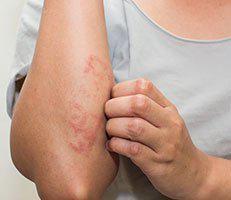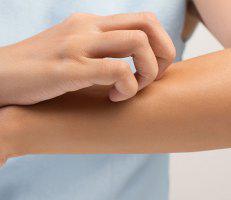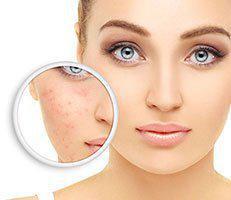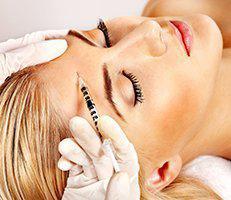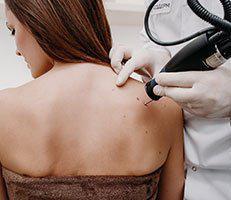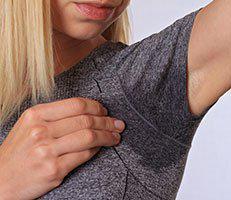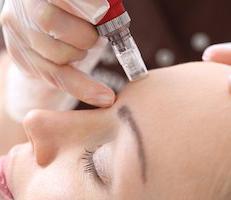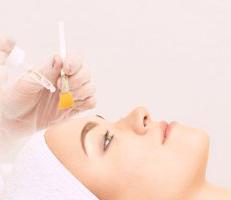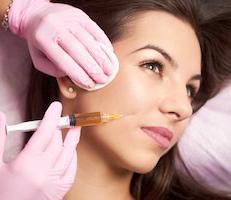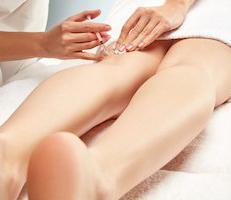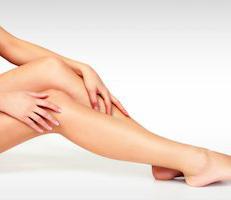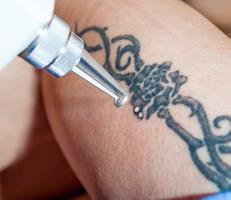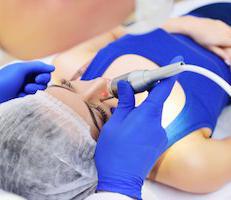Mohs Surgery
Greater Charlotte, NC area
Mohs Surgery Q & A
What is Mohs Micrographic Surgery?
Mohs surgery is a specialized treatment for the removal of skin cancer in certain situations. This state-of-the-art treatment is usually performed on skin cancers that are large, that are recurrent and have not been effectively treated with conventional methods, or for skin cancers on the head, neck, and face, where loss of healthy skin should be minimized. The physician is both the surgeon and the pathologist and received extra training to obtain this skill set. This unique approach offers the highest cure rate and is up to 99% effective in removing many types of skin cancer. It is typically performed as an outpatient procedure with local anesthesia.
What are the benefits of Mohs surgery?
Mohs surgery is an effective way to treat skin cancer, and many patients prefer it due to its many benefits, including:
- A high cure rate
- Minimal removal of healthy tissue
- Great for all parts of your body, including areas with little tissue such as the eyelids or hand
- Delivers an excellent aesthetic result with minimal scarring
Mohs surgery can be performed right in the office of Atlantic Dermatology as an outpatient procedure, meaning you go home the same day.
Who is a candidate for Mohs surgery?
Many types of skin cancer are eligible for Mohs surgery, especially basal cell and squamous cell carcinoma. Dr. Crane and Dr. Cook evaluate your condition to determine if you’re a good candidate. They utilize Mohs surgery when your cancer:
- Has returned after initial treatment
- Appears in an area with thin tissue material, such as the nose, ear, scalp, genitals, or eyelid
- Manifests as aggressive or large
Mohs surgery can treat certain types of melanoma that present themselves in the earliest stages. The process for treatment of melanoma is a little different and known as “slow” Mohs, as you need to wait longer – about a day – between each tissue removal and evaluation to determine if the surgery eradicates the cancer cells.
To learn more about Mohs surgery as an effective way to treat skin cancer, call Atlantic Dermatology or book an appointment online.
Click here for Pre-MOHS Surgery Instructions
FREQUENTLY ASKED QUESTIONS ABOUT THE WOUND HEALING PROCESS
When will my scar start to fade?
It takes a full year for the healing process to be complete. Most of the significant changes are in the first 6 months. Your scar will go through several stages of healing before the redness fades and it settles down into a fine whitish line.
When will the area of my surgery feel normal again?
It can take 1-2 years for the nerves to “settle down”. Small superficial nerves are always cut during the removal of the cancer. As they grow back you may experience numbness, tingling or a crawling sensation. Some areas may never gain full feeling back. This is unavoidable and normal.
Why does my scar feel lumpy?
You may feel bumps and lumps under the skin. This is normal and is due to the dissolvable sutures under the surface of the skin. These deep sutures take months to completely dissolve and the scar will not be smooth until this time. Occasionally a red bump or pustule forms along the suture line when a buried stitch works its way to the surface. This is only temporary, and applying a warm compress to the sport usually helps it resolve. If it does not resolve please call us.
Why is my scar puffy?
Sometimes 1-3 months after surgery a scar will become raised or “puffy”. These scars will often benefit from a small injection or minor surgical revision. If needed, this is usually performed 3-6 months after surgery. If this is something you think you might require, please do not hesitate to call us for an appointment.
Can my wound open up?
During the first several weeks following your surgery, your wound is fragile. Be careful not to pull or tug on it, as it could break open. It will take the area a full 6 months to return to 95% of its original strength.
Why is it hard to breathe through my nose?
If you had surgery on or near your nose, the swelling inside the nose may persist for several months. Initially this may feel like a lump inside the nose but will shrink with time.
When may I apply make-up or sunscreen?
You may apply make-up and/or sunscreen after the sutures are removed and the wound is completely healed (no oozing areas). Once healed, good sun protection is important as the ‘new skin’ in the wound area is sensitive to sun.
Should I use anti-scar creams or massage?
Generally these products are not harmful, unless they irritate your skin or you become allergic to them. There are a number of creams and products that help to moisturize the wound, which may help improve the healing. Plain Vaseline works very well, is inexpensive, and non-allergenic. Daily massage of the scar for 10-15 minutes a day can help the scar fade. You should wait at least 3 weeks before starting massage to avoid stress on the scar.
Will I have another skin cancer?
You have demonstrated the ability to have a skin cancer. Your best defense is to see your dermatologist on a regular basis. Regular skin checks can detect skin cancers even before you notice them. Prevention is key and good sun protection, including sunscreen is crucial.
Remember it takes a full year for your final result. Patience is the key, but if any time you feel you need to be seen or just need reassurance, do not hesitate to call: (910) 251-9944.

"Dr. Crane has a wealth of experience and he continues to relate with his patients with a very friendly and approachable demeanor."
Verified Patient

"My family has been going to Dr. Crane for many years. I have always had a positive experience during our visits. The front staff has always been very nice[...]"
Tammy H.

"Dr. Crane has been my doctor since 2000 and he also took care of my Dad. I have always found his staff to be professional. I enjoy Dr. Crane's personality. "
Sandra W.

"Dr. Crane is always pleasant, professional, and knows his stuff. The office staff have always been professional and pleasant at every visit."
Lee M.


